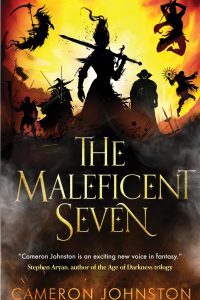Ian Mond Reviews Sing, Nightingale by Marie Hélène Poitras
 Sing, Nightingale, Marie Hélène Poitras (Coach House Books 978-1-55245-448-0, $22.95, 176pp, tp) February 2023.
Sing, Nightingale, Marie Hélène Poitras (Coach House Books 978-1-55245-448-0, $22.95, 176pp, tp) February 2023.
I’m not sure I’ve read a book quite so fecund, so bursting with life (and sex) as Sing, Nightingale by Quebec writer Marie Helene Poitras (superbly translated from Québécois by Rhonda Mullins). Set during the height of Spring in the French countryside, the action centres in and around the Malmaison estate. The manor has seen better days; once famous for its buffalo milk (Era of the Horn), pigeons (Era of the Wing), and sheep (Era of the Hoof), the Estate now relies on three pregnant donkeys. It’s not surprising then that the current head of the manor, known as the “Donkey Father,” dreams not of Malmaison but of becoming the mayor of the nearby village Noirax. With his interests focussed elsewhere, the father has employed Alienor, a young woman with “immodest” eyes, to tend to the Estate. He is also excited by the news that his son, Jeanty, is returning to Malmaison. (Jeanty left his wife after his mother-in-law walked in on him “dressed in the scullery maid’s clothes”). The Donkey Father hopes that Jeanty and Alienor will fall in love and move into the Perfume House, a cottage on the Estate, which has been closed since the death of Jeanty’s mother, Pampelune. But with the arrival of both Jeanty and Alienor, the harridan, once the village wet nurse, now Malmaison’s housekeeper, foresees that “evil will descend on the young one, and nothing can protect him from it.”
I don’t typically speak about the quality of a translation because, as an English speaker who only speaks a smattering of Hebrew and Yiddish, it’s near impossible for me to judge whether the translator has fully captured the author’s intent. But you don’t need to be fluent in French to appreciate Rhonda Mullins’s work in this translation. She skilfully captures Poitras’s lush and sensual language:
After the meal, he takes the merchant to the lake and watches her slip into the pristine water. She is plump, pink, and fatty like ham hocks… when she emerges from the lake, milk runs from her breasts. To drink her milk, feast on her cherry, press her up against the cold stone of the wall and grow stiff inside her.
At a higher level of difficulty, Mullin aptly handles the novel’s postmodern flourishes. It begins with the opening page where the village is compared to a little theatre – with “cardboard sets, a stage on which to deliver lines, and puppets awaiting a hand to bring them to life…” – a conceit that carries through the novel with varying levels of success. Sometimes it’s a little on the nose, especially toward the novel’s climax, where the meta-narrative begins to take hold (“Do they know that they are characters in a play, made of paper, ink and pixels…. That Noirax is trapped in a novel, that they are living a still life?”). But sometimes, that same imagery perfectly symbolises the rot at the heart of Malmaison, such as when the father leaves for the village and the Estate “folds down like a cardboard set that has been dismantled.” I was more enamoured by the inclusion of traditional children’s song lyrics, with the French and English running side by side, which provides Sing, Nightingale with a haunting soundtrack.
The novel’s rich language and playful structure are emblematic of a postmodern gothic that seeks to rework familiar tropes. Poitras doesn’t so much as subvert the cliché of the run-down estate hiding both secrets and bodies, as amplify the signal, shocking us with revelations, uncovered by Alienor, of the cruelty and horror the fathers have perpetrated on women across the decades. Similarly, Alienor, as an agent of change, joins a growing group of contemporary gothic heroines, such as Asher Todd from A.G. Slatter’s The Path of Thorns and Noemí Taboada from Silvia Moreno-Garcia’s Mexican Gothic, who are empowered to undermine the social and economic structures set up by powerful men. While Sing, Nightingale is very much about giving voice to victims of sexual and physical abuse, Poitras recognizes that trans-folk are also the target of persecution and violence. As such, the most poignant and moving moment, facilitated by Alienor, is when Jeanty/Jeantylle embraces her identity as a woman.
Along with the sumptuous prose, the musical interludes and the moments of metafiction, Sing, Nightingale is a passionate, full-throated deconstruction of the patriarchy that’s well worth your time.
Ian Mond loves to talk about books. For eight years he co-hosted a book podcast, The Writer and the Critic, with Kirstyn McDermott. Recently he has revived his blog, The Hysterical Hamster, and is again posting mostly vulgar reviews on an eclectic range of literary and genre novels. You can also follow Ian on Twitter (@Mondyboy) or contact him at mondyboy74@gmail.com.
This review and more like it in the April 2023 issue of Locus.
 While you are here, please take a moment to support Locus with a one-time or recurring donation. We rely on reader donations to keep the magazine and site going, and would like to keep the site paywall free, but WE NEED YOUR FINANCIAL SUPPORT to continue quality coverage of the science fiction and fantasy field.
While you are here, please take a moment to support Locus with a one-time or recurring donation. We rely on reader donations to keep the magazine and site going, and would like to keep the site paywall free, but WE NEED YOUR FINANCIAL SUPPORT to continue quality coverage of the science fiction and fantasy field.
©Locus Magazine. Copyrighted material may not be republished without permission of LSFF.






